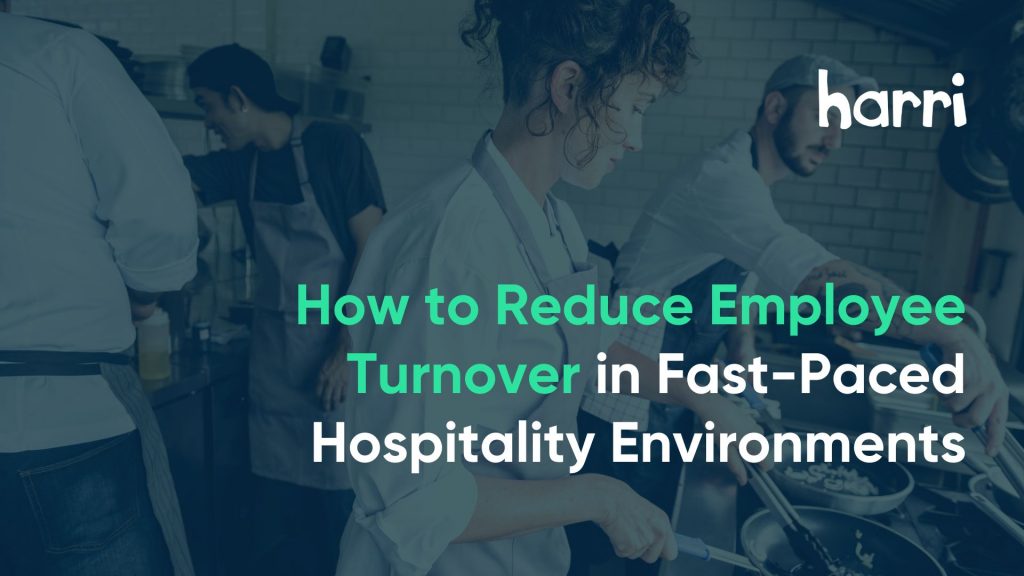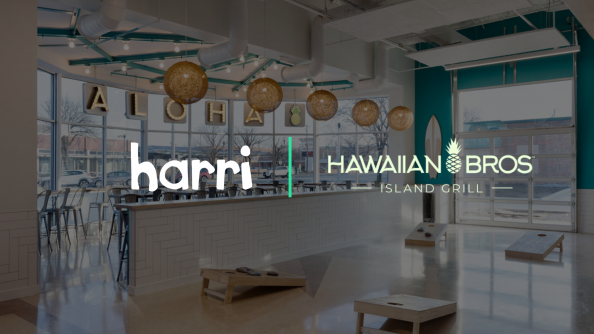Innovative Approaches to Reduce Employee Turnover in Fast-Paced Hospitality Environments

- By Harri Insider Team | March 5, 2024
In the dynamic world of hospitality, managing employee turnover is a perennial challenge. The industry’s fast-paced nature, coupled with high-pressure work environments, often leads to high employee attrition. However, innovative strategies can significantly reduce turnover, enhancing both employee satisfaction and organizational efficiency.
In this article, we’re breaking down the most common causes of employee turnover, in order to identify actionable steps you can take, from engaging your workforce, to scheduling smarter, in order to tackle this complex challenge.

Understanding the Causes of High Turnover in the Hospitality Industry
Employee turnover in the hospitality industry is a multi-faceted issue influenced by various factors. Let’s delve deeper into these causes, providing specific examples to illustrate their impact:
1. Rigid Schedules and Lack of Flexibility
In the hospitality industry, rigid scheduling is unfortunately a common practice. For instance, a hotel front desk employee may be required to work night shifts for prolonged periods without the option to swap or alter their schedule. Such inflexibility can lead to dissatisfaction, especially for employees juggling educational commitments or family responsibilities. Introducing flexible scheduling options, like allowing shift swaps or providing part-time opportunities, can significantly reduce turnover rates.
2. Low Wages and Inadequate Compensation
Hospitality jobs, particularly in food service and housekeeping, often offer wages close to the minimum, with a third of workers indicating plans to leave the industry due to poor pay. This disparity in compensation can prompt employees to seek better-paying roles elsewhere. Offering competitive wages and benefits is essential to retain a dedicated workforce
3. Toxic Work Environments and Stress
A toxic work environment in hospitality can manifest in various ways, from kitchen staff facing constant high-pressure situations to housekeepers dealing with unrealistic cleaning quotas. Instances of bullying or harassment, as reported by a significant percentage of female restaurant workers, further contribute to a hostile work atmosphere. Establishing a culture that prioritizes employee well-being and enforces policies against harassment can create a more positive environment.
4. Inefficient Communication
Effective communication is crucial in hospitality. Of course, ensuring that management communicates expectations and changes transparently is just as important as ensuring staff actually read and comprehend messages from their managers. When done correctly, this can enhance staff engagement and reduce turnover.
5. Lack of Recognition and Appreciation
In many hospitality settings, hard work often goes unnoticed. Implementing recognition programs, where exceptional work is regularly acknowledged, can significantly boost morale and loyalty.
6. Job Insecurity and Seasonal Nature of Work
The seasonal nature of many hospitality roles, such as in beach resorts or ski lodges, can create a sense of job insecurity among employees. This can lead to higher turnover as employees seek more stable employment options. Transparent communication about seasonal work expectations and offering incentives for seasonal employees to return can help mitigate this issue.
7. Limited Career Growth Opportunities
Career advancement opportunities in the hospitality industry can often appear limited. Providing clear career progression paths and investing in employee development can encourage staff to stay and grow within the organization.
8. Neglected Training and Development
Lack of proper training can leave employees feeling ill-equipped to handle their responsibilities. Investing in thorough and continuous training programs can improve employee confidence and performance.
9. Work-Life Imbalance and Burnout
Excessive work hours without adequate rest can lead to burnout, a common issue in hospitality, an industry known for long hours and peak seasons that can last months. Prioritizing employee health and well-being through reasonable work schedules and adequate rest periods is essential for reducing turnover.
Addressing these issues requires an ongoing and dynamic approach. By understanding the challenges employees face in the hospitality industry and implementing targeted strategies to address them, organizations can significantly improve employee retention and create a more stable and productive workforce.

Strategies to Reduce Turnover in the Hospitality Industry
Creating a Positive Work Culture
A positive work environment is fundamental to employee retention. This involves cultivating a supportive atmosphere where employees feel valued and respected. Implementing measures to address and prevent workplace harassment and bullying, along with stress management programs, can significantly improve the work environment.
Implementing Effective Training Programs
Comprehensive training programs can boost employees’ confidence and competence, leading to improved job satisfaction and performance. By investing in employee development, organizations demonstrate their commitment to their workforce, thereby enhancing loyalty and reducing turnover.
Leveraging Technology for Engagement and Retention
Platforms like Harri offer innovative solutions to enhance employee engagement and retention. Harri Engage provides tools for managers to monitor and improve team engagement through features like sentiment analysis, feedback collection, and automated engagement strategies. These tools enable managers to proactively address issues that could lead to turnover before they occur, with special attention paid to the critical first 90 days of a new hire’s employment.
The best part is that there’s no need for employees to download yet another app they are unlikely to open on a regular basis. Harri Engage connects with your employees where they already live and work in one consolidated app for effective engagement, measuring sentiment, checking schedules and swapping shifts.
Enhancing Flexibility in Scheduling
Introducing flexible scheduling can significantly impact employee satisfaction. Harri’s Intelligent Scheduling Software offers an integrated approach to optimize scheduling, taking into account the unique demands of the hospitality industry. This system allows employees to engage in shift management, including shift swaps and flexible hours, promoting a better work-life balance.
Competitive Compensation and Benefits
Ensuring that wages are competitive and fair is crucial. Additionally, offering comprehensive benefits packages, including health, vision, and dental insurance, as well as retirement savings plans, can make a position more attractive and reduce turnover.
Clear Communication and Recognition
Maintaining clear and consistent communication is vital in the hospitality industry. This involves not only conveying job expectations and changes but also recognizing and celebrating employees’ achievements and milestones. Recognition programs and open communication channels can significantly boost employee morale.
Increasing Employee Retention in Hospitality: How Harri Can Help
Harri Engage: A Tool for Employee Engagement
Harri Engage is designed to connect with employees effectively, offering a user-friendly platform for managers to automate engagement strategies. It allows managers to support new employees, celebrate special milestones, and share important news or communications effectively. The platform’s ability to ask quick questions and gather employee feedback efficiently makes it an indispensable tool for managing turnover.
Harri Intelligent Scheduling Software
Harri’s platform provides a smart scheduling system used by operators large and small that considers various factors, including historical sales and demand forecasting, to create optimal schedules. It helps in reducing the administrative burden on managers, allowing them to focus more on employee engagement and satisfaction. The software’s integration with Harri IQ further empowers teams with AI-driven data analytics for better decision-making regarding retention strategies.
Retaining Employees for the Long Term with Harri
Reducing employee turnover in the hospitality industry requires a multifaceted approach. By understanding the underlying causes and implementing strategies that focus on employee engagement, training, flexibility, and communication, organizations can significantly lower turnover rates.
Platforms like Harri, built for the frontlines, play a crucial role in these efforts, offering innovative solutions tailored to the unique needs of the hospitality industry. By prioritizing employee well-being and satisfaction, hospitality businesses can build a more stable and committed workforce, ultimately leading to long-term success. To learn more about us, request a demo with our team today!





















